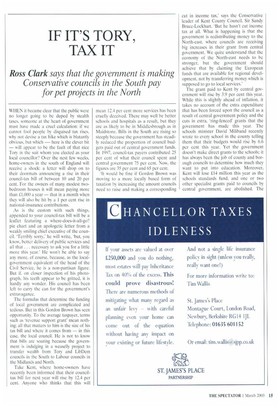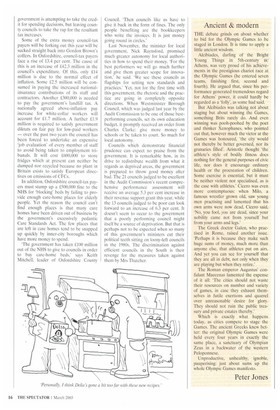IF IT'S TORY, TAX IT
Ross Clark says that the government is making
Conservative councils in the South pay for pet projects in the North
WHEN it became clear that the public were no longer going to be duped by stealth taxes, someone at the heart of government must have made a cruel calculation: if we cannot fool people by disguised tax rises, why not devise a tax hike which is blatantly obvious, but which -here is the clever bit — will appear to be the fault of that nice Tory in the suit whom you elected as your local councillor? Over the next few weeks, home-owners in the south of England will receive a shock: a letter will drop on to their doormats announcing a rise in their council-tax bill of between 10 and 20 per cent. For the owners of many modest twobedroom houses it will mean paying more than £1,000 a year — that in a month when they will also be hit by a 1 per cent rise in national-insurance contributions.
As is the custom with such things, appended to your council-tax bill will be a leaflet featuring a where-does-it-all-go? pie chart and an apologetic letter from a weakly smiling chief executive of the council. 'Terribly sorry,' he will write, tut, you know, better delivery of public services and all that . .. necessary to ask you for a little more this year.' He won't be able to say any more, of course, because, as the localgovernment equivalent of the head of the Civil Service, he is a non-partisan figure. But if, on closer inspection of his photograph, his teeth appear to be gritted, it is hardly any wonder. His council has been left to carry the can for the government's extravagance.
The formulas that determine the funding of local government are complicated and tedious. But in this Gordon Brown has seen opportunity. To the average taxpayer, terms such as 'revenue support grant' mean nothing; all that matters to him is the size of his tax bill and where it comes from — in this case, the local council. He is not to know that bills are soaring because the government is indulging in a weaselly project to transfer wealth from Tory and LibDem councils in the South to Labour councils in the Midlands and North.
Take Kent, where home-owners have recently been informed that their counciltax bill for next year will rise by 12.4 per cent. Anyone who thinks that this will
mean 12.4 per cent more services has been cruelly deceived. There may well be better schools and hospitals as a result, but they are as likely to be in Middlesbrough as in Maidstone. Bills in the South are rising so steeply because the government has steadily reduced the proportion of council budgets paid out of central government funds. In 1997, council-tax payers contributed 25 per cent of what their council spent and central government 75 per cent. Now, the figures are 35 per cent and 65 per cent.
'It would be fine if Gordon Brown was moving to a more locally based form of taxation by increasing the amount councils need to raise and making a corresponding cut in income tax,' says the Conservative leader of Kent County Council, Sir Sandy Bruce-Lockhart. 'But he hasn't cut income tax at all. What is happening is that the government is redistributing money to the North-east, where councils are receiving big increases in their grant from central government. We quite understand that the economy of the North-east needs to be stronger, but the government should achieve that by claiming the European funds that are available for regional development, not by transferring money which is supposed to go to local services.'
The grant paid to Kent by central government will rise by 3.9 per cent this year. While this is slightly ahead of inflation, it takes no account of the extra expenditure that has been forced upon the council as a result of central government policy and the cuts in extra, `ring-fenced' grants that the government has made this year. The schools minister David Miliband recently wrote to every school in the county telling them that their budgets would rise by 6.6 per cent this year. Yet the government doesn't make direct grants to the schools; it has always been the job of county and borough councils to determine how much they want to put into education. Moreover, Kent will lose £14 million this year as the schools standards fund, and one or two other specialist grants paid to councils by central government, are abolished. The government is attempting to take the credit for spending decisions, but leaving county councils to take the rap for the resultant tax increases.
Some of the extra money council-tax payers will be forking out this year will be sucked straight back into Gordon Brown's coffers. In Oxfordshire, council-tax payers face a rise of 13.4 per cent. The cause of this is an increase of £42.3 million in the council's expenditure. Of this, only £14 million is due to the normal effect of inflation. Some £2.5 million will be consumed in paying the increased nationalinsurance contributions of its staff and contractors. Another £300,000 is needed to pay the government's landfill tax. A nationally agreed above-inflation pay increase for white-collar workers will account for £1.7 million. A further £1.9 million is required to satisfy government diktats on fair pay for low-paid workers — over the past two years the council has been forced to undertake an expensive 'job evaluation' of every member of staff to avoid being taken to employment tribunals. It will cost £600,000 to store fridges which at present can neither be dumped nor recycled because no plant in Britain exists to satisfy European directives on emissions of CFCs.
In addition, Oxfordshire council-tax payers must stump up a £500,000 fine to the NHS for 'blocking' beds by failing to provide enough care-home places for elderly people. Yet the reason the council can't find enough places is that many care homes have been driven out of business by the government's excessively pedantic Care Standards Act. The few places that are left in care homes tend to be snapped up quickly by inner-city boroughs which have more money to spend.
'The government has taken £100 million out of the NHS to give to councils in order to buy care-home beds,' says Keith Mitchell, leader of Oxfordshire County Council. 'Then councils like us have to give it back in the form of fines. The only people benefiting are the bookkeepers who write the invoices. It is just money going round in circles.'
Last November, the minister for local government, Nick Raynsford, promised much greater autonomy for local authorities in how to spend their money. 'For the best performers we will go much further and give them greater scope for innovation,' he said. We see these councils as flagships for setting new standards and practices.' Yet, not for the first time with this government, the rhetoric and the practice are going in completely opposite directions. When Westminister Borough Council, which was judged last year by the Audit Commission to be one of those bestperforming councils, set its own education budget, it promptly received an order from Charles Clarke: give more money to schools or be taken to court. So much for local autonomy.
Councils which demonstrate financial prudence can expect no praise from the government. It is remarkable how, in its drive to redistribute wealth from what it regards as deprived areas, the government is prepared to throw good money after bad, The 21 councils judged to be excellent in the Audit Commission's recent comprehensive performance assessment will receive an average 5.3 per cent increase in their revenue support grant this year, while the 13 councils judged to be poor can look forward to an increase of 6.3 per cent. It doesn't seem to occur to the government that a poorly performing council might itself be a source of deprivation. But that is perhaps not to be expected when so many of this government's ministers cut their political teeth sitting on loony-left councils in the 1980s. The discrimination against efficient councils in the South is their revenge for the measures taken against them by Mrs Thatcher.



















































































 Previous page
Previous page